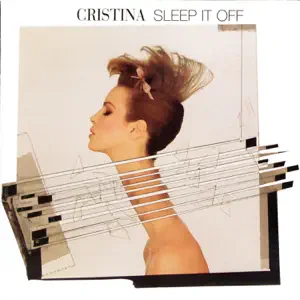


NACIMIENTO
2 de enero de 1959
Acerca de Cristina
Combining Bertolt Brecht, Leiber & Stoller, punk, and disco into a distinctive brew that skewered the excess of the '70s and '80s, Cristina's acerbic wit made her a revered cult figure even though she only released two albums and a handful of singles. Starting with 1978's "Disco Clone," she tapped into her era's cynicism, but she was also remarkably good at updating classic disillusionment. Her 1980 version of "Is That All There Is?" featured new lyrics that were so unsettling, Lieber & Stoller successfully sued to have it withdrawn for years, while 1981's "Things Fall Apart" took holiday gloom to darkly humorous extremes. Her Kid Creole-produced 1980 album Cristina paired the glitziest side of disco with her crisply enunciated, deadpan vocals in ways that were too sophisticated to be mere parody. However, it was with 1984's Sleep It Off -- which spanned new wave, synth pop, and Dylan-esque acoustic ballads -- that Cristina proved she was an artist ahead of her time. The playful irony in her music and her skill at subverting pop predicted the careers of Madonna and Cyndi Lauper later in the '80s, as well as the work of Peaches, Ladytron, Lady Gaga, and Lana Del Rey in the decades to come.
Born on January 17, 1956 to American writer/illustrator Dorothy Monet and French neo-Freudian psychoanalyst Jacques Palaci, Cristina Monet Palaci had a culturally literate childhood while growing up in England, France, and Italy as well as the U.S. After studying drama at the Royal Central School of Speech and Drama and at Harvard University -- where she won the History and Literature Prize during her sophomore year -- she became a theater writer for The Village Voice. While writing for the alt-weekly in 1978, she met and began dating Michael Zilkha, co-founder of the eclectic record label ZE with Michel Esteban, and an Oxford graduate whose family owned the British retailer Mothercare.
Cristina began her musical career that that year with "Disco Clone," a single written by Ronald Melrose, one of her former Harvard classmates. Intended to capitalize on the disco craze, the John Cale-produced track marked her inaugural collaboration with songwriter/arranger August Darnell (aka Kid Creole). The first release from ZE, it became a cult hit that led to several more singles, including a reworked "Disco Clone" featuring an uncredited Kevin Kline, a synth pop cover of the Beatles' "Drive My Car," and a version of Leiber & Stoller's world-weary "Is That All There Is?" with new lyrics by Cristina that were so provocative that the songwriting duo was granted an injunction against further sales of it in 1980. That year also saw the release of Cristina's self-titled debut album, which was produced by Darnell, mixed Latin beats and disco with cinematic imagery. She followed it with the eerie holiday single "Things Fall Apart" which appeared on 1981's ZE Christmas Record and was produced by Was (Not Was).
Following her 1983 marriage to Zilkha, Cristina reunited with Don Was in his Detroit studio to make her second album,1984's new wave-tinged Sleep It Off. Joined by the Knack's Doug Feiger and Barry Reynolds, and Ben Brierley of Marianne Faithfull's band, she put her own playfully jaded spin on John Conlee's "She Can't Say That Anymore," Van Morrison's "Blue Money," and "Ballad of Immoral Earnings," an adaptation of Brecht's "Zuhälter Ballade," as well as original tunes such as "He Dines Out on Death" and "What's a Girl to Do?," which she later described as her anthem. Sporting an album cover designed by Jean-Paul Goude (who later used a similar idea for the artwork for Grace Jones' Slave to the Rhythm), Sleep It Off earned critical acclaim but not sales. Under the mistaken belief that her husband had bought her career, Cristina retired from music.
After starting a family with Zilkha and moving to Texas, Cristina divorced him in 1990 and moved back to New York to focus on writing essays and reviews for publications including The Times Literary Supplement, Tatler and London Literary Review. Though health issues such as the autoimmune disorder relapsing polychondritis prevented her from staging much of a comeback, her music continued to be held in high esteem, and her prominence grew in the 2000s. In 2003, Ladytron featured "What's a Girl to Do?" on their compilation Softcore Jukebox. The following year, Sleep It Off and her first album -- rechristened Doll in a Box -- were reissued by ZE with bonus tracks that included songs produced and co-written by Robert Palmer. Cristina came out of retirement briefly in 2005 to contribute vocals to "Urgent Anxious," a collaboration with Ursula 1000 that appeared on his 2006 album Here Comes Tomorrow. On March 31, 2020, Cristina died after testing positive for COVID-19. She was 64. ~ Heather Phares
Born on January 17, 1956 to American writer/illustrator Dorothy Monet and French neo-Freudian psychoanalyst Jacques Palaci, Cristina Monet Palaci had a culturally literate childhood while growing up in England, France, and Italy as well as the U.S. After studying drama at the Royal Central School of Speech and Drama and at Harvard University -- where she won the History and Literature Prize during her sophomore year -- she became a theater writer for The Village Voice. While writing for the alt-weekly in 1978, she met and began dating Michael Zilkha, co-founder of the eclectic record label ZE with Michel Esteban, and an Oxford graduate whose family owned the British retailer Mothercare.
Cristina began her musical career that that year with "Disco Clone," a single written by Ronald Melrose, one of her former Harvard classmates. Intended to capitalize on the disco craze, the John Cale-produced track marked her inaugural collaboration with songwriter/arranger August Darnell (aka Kid Creole). The first release from ZE, it became a cult hit that led to several more singles, including a reworked "Disco Clone" featuring an uncredited Kevin Kline, a synth pop cover of the Beatles' "Drive My Car," and a version of Leiber & Stoller's world-weary "Is That All There Is?" with new lyrics by Cristina that were so provocative that the songwriting duo was granted an injunction against further sales of it in 1980. That year also saw the release of Cristina's self-titled debut album, which was produced by Darnell, mixed Latin beats and disco with cinematic imagery. She followed it with the eerie holiday single "Things Fall Apart" which appeared on 1981's ZE Christmas Record and was produced by Was (Not Was).
Following her 1983 marriage to Zilkha, Cristina reunited with Don Was in his Detroit studio to make her second album,1984's new wave-tinged Sleep It Off. Joined by the Knack's Doug Feiger and Barry Reynolds, and Ben Brierley of Marianne Faithfull's band, she put her own playfully jaded spin on John Conlee's "She Can't Say That Anymore," Van Morrison's "Blue Money," and "Ballad of Immoral Earnings," an adaptation of Brecht's "Zuhälter Ballade," as well as original tunes such as "He Dines Out on Death" and "What's a Girl to Do?," which she later described as her anthem. Sporting an album cover designed by Jean-Paul Goude (who later used a similar idea for the artwork for Grace Jones' Slave to the Rhythm), Sleep It Off earned critical acclaim but not sales. Under the mistaken belief that her husband had bought her career, Cristina retired from music.
After starting a family with Zilkha and moving to Texas, Cristina divorced him in 1990 and moved back to New York to focus on writing essays and reviews for publications including The Times Literary Supplement, Tatler and London Literary Review. Though health issues such as the autoimmune disorder relapsing polychondritis prevented her from staging much of a comeback, her music continued to be held in high esteem, and her prominence grew in the 2000s. In 2003, Ladytron featured "What's a Girl to Do?" on their compilation Softcore Jukebox. The following year, Sleep It Off and her first album -- rechristened Doll in a Box -- were reissued by ZE with bonus tracks that included songs produced and co-written by Robert Palmer. Cristina came out of retirement briefly in 2005 to contribute vocals to "Urgent Anxious," a collaboration with Ursula 1000 that appeared on his 2006 album Here Comes Tomorrow. On March 31, 2020, Cristina died after testing positive for COVID-19. She was 64. ~ Heather Phares
Nosotros
Notas
